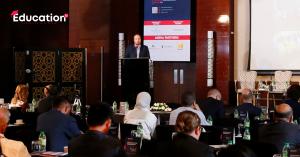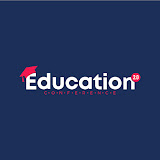Education 2.0 Conference To Review The Rise In Phishing Scams
Education 2.0 Conference’s Las Vegas Edition to review rise of phishing scam offenses in education and promote digital resilience through expert-led sessions.
LAS VEGAS, NV, UNITED STATES, July 3, 2025 /EINPresswire.com/ -- Scheduled from April 7–9, 2026, at Bellagio Hotel & Casino, Las Vegas, the upcoming Education 2.0 Conference will spotlight a digital threat affecting institutions and individuals alike, increasing phishing scam cases in education. As cybercriminals grow more adept at mimicking legit academic communication, the consequences for students, parents, and educators are becoming more critical. With its upcoming edition, this conference aims to offer a collaborative space where thought leaders can review emerging education scams and share strategies to strengthen digital resilience.The three-day event will bring together educators, cybersecurity experts, edtech entrepreneurs, policymakers, institutional leaders, and other stakeholders under a roof. Designed as a knowledge-sharing and networking platform, the Education 2.0 Conference opens space for stakeholders to discuss not just innovation but also the digital vulnerabilities that accompany it. By putting cyber safety under the spotlight, the conference aims to equip the education community with the awareness and insights needed to identify and avoid scams, especially those masked in legitimacy. This focus sits alongside the conference’s commitment to ensuring legitimacy and transparency in its event services.
In today’s digital-first academic landscape, the education sector has emerged as a prime target for cyberattacks. From student records to financial data, attackers seek high-value information that can be misused for identity theft or financial fraud. Institutions across the US have reported millions in losses, reflecting the urgent need for collective action across the sector.
Phishing scams in education have become more sophisticated, no longer limited to obvious spam or clumsy hoaxes. Fraudulent messages often appear as authentic university portals, scholarship announcements, or internal faculty communications. These schemes exploit timing, such as enrollment seasons or tech upgrades, and prey on urgency and trust. For students navigating deadlines and tuition, a polished scam can feel like just another routine task, making it all the more dangerous.
What makes phishing successful isn’t just technology; it’s human behavior. A convincing scam doesn’t need to bypass security systems if it can persuade someone to hand over their credentials or personal data willingly. As hybrid and remote learning continue, students and educators manage multiple digital tools and platforms, often without the cybersecurity training to differentiate real ones from scams. This growing disconnect between digital access and digital awareness is what the Education 2.0 Conference seeks to bridge.
At its core, the conference asserts that educational progress must be paired with digital protection. It's not enough to bring innovation into the classroom if learners and educators are left vulnerable outside of it. By initiating meaningful conversations around scam detection, risk response, and information ethics, the Education 2.0 Conference reinforces the idea that cyber literacy is now fundamental to academic excellence.
The conference's upcoming edition is expected to feature a range of panel discussions, fireside chats, and expert exchanges that may explore topics such as the mechanics of phishing scams, early warning signs, and strategies for prevention. Drawing on thought leadership and real-world examples, speakers are anticipated to offer insights on how institutions and individuals can better navigate the digital landscape—especially when it comes to evaluating the legitimacy of online communication.
Beyond scam awareness, discussions at the upcoming event are likely to examine how educational institutions can nurture a culture of proactive digital security. From shaping campus-wide awareness efforts to encouraging cyber hygiene and exploring tools like multi-factor authentication, such conversations aim to move beyond reactive measures. There may also be a focus on the emotional toll of online scams, particularly on international students or digital newcomers, bringing empathy to the forefront of cybersecurity dialogue.
"Digital transformation shouldn’t come at the cost of personal security. With so much at stake—from financial aid to intellectual property—we believe it’s time to treat cybersecurity not as an IT issue, but as an education issue," says Sai Narula, Manager for the Education 2.0 Conference. “This year, we’re proud to offer a platform where digital safety is positioned as a shared academic priority.”
While cybersecurity may take the spotlight in the coming edition, the Education 2.0 Conference continues to serve as a multi-dimensional platform for driving innovation and inclusivity across education systems. Discussions will span topics such as AI-powered learning, student wellness, curriculum evolution, and the future of assessment models. The agenda supports holistic development, enabling attendees to not only address challenges but also to lead transformation in meaningful ways.
With an overarching vision of creating a global education ecosystem where trust, innovation, and security coexist, the Education 2.0 Conference aims to shape a future where every learner can confidently explore knowledge without fear of exploitation or misinformation.
About the Education 2.0 Conference
The Education 2.0 Conference is an international platform that convenes key voices from across the education sector. Held in the United States and Dubai, it brings together academics, entrepreneurs, technologists, and changemakers to discuss emerging trends, share best practices, and promote partnerships that move education forward. Through carefully curated sessions, the event provides insights that are not only forward-thinking but also actionable in today’s rapidly evolving learning environments.
Bhawna Banga
Education 2.0 Conference
email us here
Visit us on social media:
LinkedIn
Instagram
Facebook
X
Legal Disclaimer:
EIN Presswire provides this news content "as is" without warranty of any kind. We do not accept any responsibility or liability for the accuracy, content, images, videos, licenses, completeness, legality, or reliability of the information contained in this article. If you have any complaints or copyright issues related to this article, kindly contact the author above.


